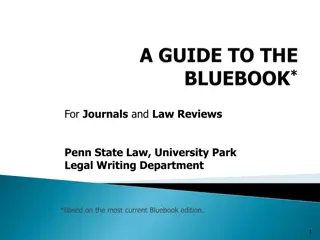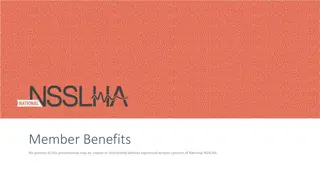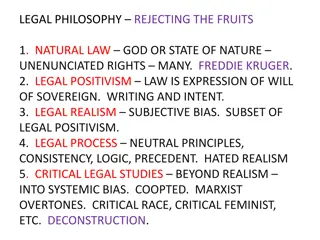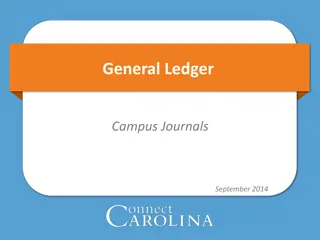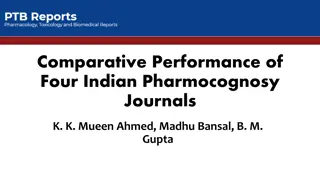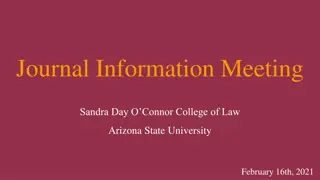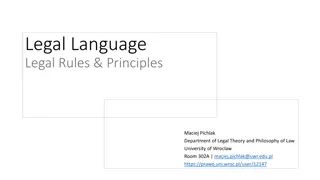Exciting Opportunities in Legal Journals
Explore the Alabama Civil Rights and Civil Liberties Law Review and the Journal of the Legal Profession for valuable opportunities in legal writing and publishing. From addressing civil rights issues to exploring dynamic changes in the legal profession, these journals offer credits, publication chances, leadership roles, and networking in a supportive environment. Eligibility is based on performance in the Bluebook Exam and Case Note, with membership benefits including editorial support, mentorship, and connections with passionate legal professionals.
Download Presentation

Please find below an Image/Link to download the presentation.
The content on the website is provided AS IS for your information and personal use only. It may not be sold, licensed, or shared on other websites without obtaining consent from the author.If you encounter any issues during the download, it is possible that the publisher has removed the file from their server.
You are allowed to download the files provided on this website for personal or commercial use, subject to the condition that they are used lawfully. All files are the property of their respective owners.
The content on the website is provided AS IS for your information and personal use only. It may not be sold, licensed, or shared on other websites without obtaining consent from the author.
E N D
Presentation Transcript
Journal Information Meeting
Write On Information Dates: Monday, May 8th at 8 AM to Monday, May 29th at 11:59 PM All four journals require both the Case Note and Bluebook Exam Every student interested in any journal is required to fully participate in write on, regardless of rank Journals may automatically offer invitations to students in a certain percentage, but those students are still required to participate in both the Case Note and Bluebook Exam All work will be submitted with an anonymous number There will be a website that lists all relevant sources and information, as well as a form to submit anonymous questions
Alabama Civil Rights and Civil Liberties Law Review What is ACRCL? ACRCL is the leading civil rights journal in the South and the only civil rights and civil liberties journal in the Deep South. ACRCL tackles the country s developments in civil rights and civil liberties law, with an emphasis on the South s particular relevance in this area. ACRCL accomplishes this through publishing work from leading scholars regarding developments in civil rights and civil liberties. Some of the topics ACRCL has published articles on include: Freedom of Speech, Wealth Segregation, Racial Justice, Gender Inequality, Economic Justice, and More. Benefits of Joining ACRCL Associate Editors receive 1 credit hour per semester. ACRCL publishes at least two student notes a year, providing you with a strong opportunity to be published alongside modern civil rights scholars. A clear schedule with YOU in mind. ACRCL is committed to supporting editors as they pursue other opportunities within the law school. You may have the opportunity to participate in a leadership position as a 3L, gaining practical experience and receiving increased credit hours per semester. 3L Mentor to help with spades, assist with your student note, and provide law school guidance. Network of current and future lawyers passionate about civil rights law. Membership Qualifications All students in good academic standing may participate in the write-on process. To be eligible for membership, ACRCL considers two components (weighed equally): The Bluebook Exam The Case Note We do NOT offer opportunities for grade-on, and grades do not factor into our scoring process. Dues $80 (can be waived). Dues are used to fund social events, editor perks (such as journal merch and editing materials), and office supplies. Questions? Maya Stevenson, Editor in Chief (maya.stevenson@law.ua.edu) Kelsey Perine, Managing Editor (kelsey.perine@law.ua.edu)
Journal of the Legal Profession What is JOLP? JOLP is the nation s first publication dedicated to exploring the dynamic changes and trends of the legal profession across a broad range of subjects. JOLP publishes cutting-edge scholarship on the topics that matter to lawyers and law students. Benefits of Joining ALR Junior Editors receive 1 credit hour per semester JOLP publishes approximately four to eight student notes per year, so you have a great chance of your work being published and nationally recognized JOLP respects the time and academic commitments of its JEs, and specifically tailors its student note process with the Moot Court competition in mind Spading is done online as opposed to a more time-consuming paper process You may have the opportunity to participate in a leadership position as a 3L, gaining practical experience and receiving additional credit hours per semester Membership Qualifications All students in good academic standing may participate in the write-on process Students in the top 25% of the class will automatically receive an invitation, but they are still required to participate in the write-on process To be eligible for membership, JOLP considers two components: Bluebook Exam: 50% Case Note: 50% Grades may be considered only if they help a student s overall score Dues $120 (can be waived) Dues are used to fund social events, editor perks, and office supplies Questions? Ashley Terry, Editor in Chief (ashley.terry@law.ua.edu) Addison Franklin, Managing Editor (addison.fuller@law.ua.edu)
Law & Psychology Review What is LPR? LPR is the second oldest journal at UA Law. Founded in 1975 by law students who were concerned with the rights of the mentally disabled, it is the leading student-edited journal exploring the interplay between law and psychology LPR is a nationally recognized journal with an expansive alumni network Benefits of Joining LPR Junior Editors receive 1 credit hour per semester LPR publishes approximately three to four student notes per year, so you have a great chance of your work being published and nationally recognized LPR s editing schedule is unique and structured to best benefit its editors. Most of JE s work is completed in the fall semester, and student notes are due in early spring. This schedule leaves ample time for other spring activities, including clinics, Moot Court, and trial ad You may have the opportunity to participate in a leadership position as a 3L, gaining practical experience and receiving additional credit hours per semester Membership Qualifications All students in good academic standing may participate in the write-on process To be eligible for membership, LPR considers two components: The Bluebook Exam (40%) The Case Note (60%) Students in the top 10% of the class will automatically receive an invitation, but they are still required to participate in the write-on process Dues $90 (can be waived) Dues are used to fund social events, editor perks, and office supplies Questions? Hope Hudgins, Editor in Chief (hope.hudgins@law.ua.edu) Ellie Schulman, Managing Editor (ellie.schulman@law.ua.edu)
Alabama Law Review What is ALR? ALR is the flagship journal of both the University of Alabama School of Law and the state of Alabama and is a nationally recognized journal of legal scholarship ALR publishes articles from leading scholars in a variety of fields Next year, we are publishing articles in the areas of constitutional law, cryptocurrency, prison reform, and criminal law, among others Benefits of Joining ALR Junior Editors receive 1 credit hour per semester ALR publishes approximately three to four student notes per year, so you have a great chance of your work being published and nationally recognized ALR gives each member the opportunity to enhance the best assets of a future lawyer: reading, researching, editing, writing, and gaining professional contacts You may have the opportunity to participate in a leadership position as a 3L, gaining practical experience and receiving additional credit hours per semester Membership Qualifications All students in good academic standing may participate in the write-on process A student s total score will be weighed as follows: Bluebook Exam: 20% Case Note: 40% Grades: 40% Students in the top 5% of the class will automatically receive an invitation, but they are still required to participate in the write-on process ALR will also reserve eight write on spots for those who have the highest composite Bluebook Exam score and Case Note score For these spots, grades will not factor in at all Dues $125 (can be waived) Dues are used to fund social events, editor perks, and office supplies Questions? Lauren Chambliss, Editor in Chief (lauren.chambliss@law.ua.edu) Anne Compton, Managing Editor (anne.compton@law.ua.edu)
How to Succeed at Write On Case Note: The topic will be a recent SCOTUS case Students do not have to use all sources provided Students also do not need to hit the 2500 word count Bluebook Exam: Read the Bluebook Exam before starting Look at the White Pages NOT the Blue Pages Answer with the specific Bluebook rule Consider using the free 30-day trial with the online Bluebook Tab your Bluebook to help with familiarity of the rules
Example Case Citation Incorrect: Andrew Ferguson, Persistent Surveillance, 74 Alabama Law Review 1 (ALR 2022). Correct: Andrew Guthrie Ferguson, Persistent Surveillance, 74 ALA. L. REV. 1 (2022). BB 16.2, 15.1: Include author s full name BB 16.3: Title of article should be italicized BB 16.4, T13: Abbreviate journal name and don t include it in parentheses Note: Make sure to follow the specific directions provided to you in the instructions for the BB Exam to receive all possible points.
Where can I learn more about the Bluebook? Podcasts https://open.spotify.com/episode/7t4pJ6pkrugbiPMI Nha9yD?si=1bu6tq0XTY2K5CIRM-Dpyw In the description for this podcast, there is a list of other helpful resources to check out, including why citations are important, common errors, and discussion of some unlikely citations Other links https://guides.library.harvard.edu/law/bluebook Basic style guide from Bluebook online (for the Whitepages) https://www.legalbluebook.com/bluebook/v21 /quick-style-guide https://guides.ll.georgetown.edu/bluebook
Journal Open House Please join the four journals on Monday, April 10th from 12 to 1 PM for an Open House to learn more about each journal and meet journal members!
Write On Information Dates: Monday, May 8th at 8 AM to Monday, May 29th at 11:59 PM All four journals require both the Case Note and Bluebook Exam Every student interested in any journal is required to fully participate in write on, regardless of rank Journals may automatically offer invitations to students in a certain percentage, but those students are still required to participate in both the Case Note and Bluebook Exam All work will be submitted with an anonymous number There will be a website that lists all relevant sources and information, as well as a form to submit anonymous questions









